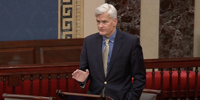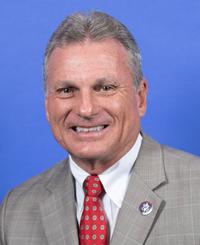
Sen. Bill Cassidy (R-Louisiana)
WASHINGTON – With a Senate oversight hearing on reducing health costs looming, costs associated with the UnitedHealth’s Medicare Advantage program are in the spotlight.
The Department of Justice is investigating how UnitedHealth records diagnoses that lead to extra payments for its Medicare Advantage plans, which are privately run versions of the government’s Medicare coverage program primarily for people 65 and older.
UnitedHealthcare is the country’s largest provider of Medicare Advantage plans, covering more than 8 million people. In Medicare Advantage plans, insurers get paid more for enrolling sicker patients even if the patients receive no additional care.
Traditional Medicare plans reimburse providers for the cost of treatments rendered, while Medicare Advantage is paid a standard rate based on the health of an individual patient. Because of this, Medicare Advantage plans have a financial incentive to make beneficiaries appear sicker than they may be to receive a higher Medicare reimbursement.
Also, a new report claims as much as $86 billion in tax-funded “ghost benefits” are going into the pockets of the Medicare Advantage industry.
According to The Center Square, the federal government pays Medicare Advantage plans rebate dollars to cover extra services – including dental, vision, hearing and over-the-counter drugs. But, a 2024 study by JAMA Network Open found that only $3.9 billion of that $86 billion went toward dental, vision and hearing benefits.
The Center Square story also says the industry spent about $16 billion on $1,000 “Flex Cards” for new enrollees. Those are prepaid cash cards often used for groceries, utility bills and even cable TV. Critics called the cards a marketing gimmick that don’t improve health outcomes.
“Amazingly, Medicare plans aren't required to tell regulators how much they spend on medical and prescription drug claims,” health policy expert Mark Merritt told The Center Square. “This is a recipe for ghost benefits that look good on paper but can’t be accessed due to red tape and high out-of-pocket costs.”
In addition, some are wondering if AARP, which is UnitedHealth’s Medicare Advantage marketing partner, also should be investigated about whether it followed federal Centers for Medicare and Medicaid Services rules to oversee UnitedHealth’s business practices. AARP makes over $1 billion annually from its partnerships with companies such as UnitedHealth.
“AARP must publicly assure seniors the allegations against United are false or explain why to endorse plans accused of defrauding Medicare,” Merritt said.
In all, Medicare Advantage insurers overbilled for $18.7 billion in 2021, according to the Wall Street Journal, which also reported that 94 percent of doctors say “prior authorization” policies make it more difficult for patients to get care. The doctors also say the situation is worse as more seniors enrolled in Medicare Advantage insurance plans instead of traditional Medicare.
In traditional Medicare, doctors simply treat patients and bill the program directly for their services. There are no insurer networks or prior authorization programs.
New CMS Administrator Dr. Mehmet Oz says the agency is committed to “crushing fraud, waste and abuse across all federal healthcare programs,” including Medicare Advantage.
“While the Administration values the work that Medicare Advantage plans do, it is time CMS faithfully executes its duty to audit these plans and ensure they are billing the government accurately for the coverage they provide to Medicare patients,” Oz said.
U.S. Senator Bill Cassidy (R-Louisiana) is a doctor who unsuccessfully tried to cut Medicare Advantage wasteful spending in the Big Beautiful Bill.
In March, Cassidy and Jeff Merkley (D-Oregon) introduced the No Unreasonable Payments, Coding, or Diagnoses for the Elderly (No UPCODE) Act to improve how Medicare Advantage plans assess patients’ health risks and reduce overpayments for care. They say the No UPCODE Act will save taxpayers billions by eliminating incentives to overcharge Medicare for care.
“Medicare is going insolvent, and our budget deficit is expanding,” Cassidy said. “We need to stop overpaying where we can if we’re to preserve Medicare for Americans who rely on it. This is the direction we need to go.”
Merkley agreed.
“Fraud, waste, and abuse by bad actors are destroying the stability of both Medicare Advantage and traditional Medicare — this must end,” Merkley said. “Our bipartisan bill cracks down on the fraudsters overcharging taxpayers by billions of dollars every year, closing the loopholes they use to turn sick patients into healthy profits.”
According to a CBO budget option report, addressing overcoding will save $124 billion over 10 years.
The No UPCODE Act would eliminate those incentives by:
Developing a risk-adjustment model that uses two years of diagnostic data instead of just one year.
Limiting the ability to use old or unrelated medical conditions when determining the cost of care.
Ensuring Medicare is only charged for treatment related to relevant medical conditions.
Closing the gap between how a patient is assessed under traditional Medicare and Medicare Advantage.
Congressman Buddy Carter (R-Georgia) is head of the House Health Subcommittee on the Energy & Commerce Committee. He’s a pharmacy owner who has been the GOP’s most vocal critic of health insurers for 15 years.

Carter
Last week, Carter retweeted a Joe Rogan Podcast News retweet of a Laura Loomer post about United Health’s issues.
Thank you, @joerogan @joeroganhq, for exposing UnitedHealth,” Carter posted. “I’ve been pushing this fight in Congress for years.”
Cassidy also is chairman of the Senate Committee on Health, Education, Labor and Pensions. He has been outspoken about reforming Medicare Advantage prior authorization rules.
“Prior authorization places more importance on process than patients,” Cassidy said. “As a doctor, I want that to change. Let’s make sure seniors are receiving timely care.”
The HELP Committee has an oversight hearing scheduled for Thursday on reducing health costs. It is unclear whether United Health, Medicare Advantage, ghost benefits or any of these issues will be addressed.
The topic of Thursday’s hearing is “Making Health Care Affordable: Solutions to Lower Costs and Empower Patients.” The witnesses expected to testify include Dr. Benedic Ippolito, a senior fellow at the American Enterprise Institute; Dr. Brian Miller, associate professor of medicine and practicing physician at Johns Hopkins University; Wendell Potter, president of the Center for Health and Democracy; and Dr. Adam Gaffney, assistant professor of medicine at Harvard University.r








